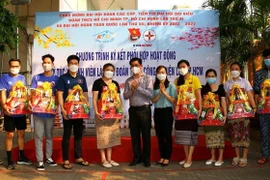 Workers undergo several procedures before they go to the Republic of Korea to work. (Photo: VIetnamPlus)
Workers undergo several procedures before they go to the Republic of Korea to work. (Photo: VIetnamPlus)Hanoi (VNA) - The International Organization for Migration (IOM) – the UN Migration Agency, in collaboration with the Department of Overseas Labour (DOLAB) under the Ministry of Labour, Invalids and Social Affairs, organised training on the application of the Standard Guideline on Public Communication to Raise Awareness for Vietnamese Migrant Workers (the Guideline).
The online training welcomed the participation of representatives from the Department of Labour, Invalids and Social Affairs and Employment Service Centres (ESCs) from 25 provinces across the country.
The Standard Guideline on Public Communication to Raise Awareness for Vietnamese Migrant Workers is part of the collaborative effort between IOM and DOLAB to promote safe labour migration and prevent human trafficking. This initiative falls under the scope of the project "Tackling Modern Slavery from Viet Nam: Enhancing behaviour change communication and assistance services", implemented by IOM with support from the UK Government.
After more than two years of disruption due to the COVID-19 pandemic, the overseas labour migration has gradually resumed, with many countries opening their borders again to foreign workers. The development of this guideline is thus timely, as it supports public communications at local level to encourage the making of informed decision for migration. It also protects vulnerable individuals and communities from the risks of modern slavery and human trafficking.
The guideline introduces practical methods to plan public communication strategies and activities that meet local situations while inducing behaviour change. The behaviour change communication methods are developed based on the experience and lessons learned from IOM's recent campaigns promoting safe migration and preventing human trafficking.
Doyen Jun, Head of Projects and Partnerships at IOM Vietnam said with the reopening of the borders, many Vietnamese workers will go overseas. However, as travel and health requirements for international travels changed so frequently and in complicated manner during COVID-19, official and reliable information on safe migration has never been more important.
“IOM appreciates this opportunity to collaborate with DOLAB to combine the efforts for our joint mission in promoting safe and regular migration, to better protect labour migrants”, she said. “IOM Viet Nam looks forward to receiving valuable feedbacks and suggestions from the provinces to better reflect the specific local context and their needs”, she stated.
Meanwhile, Dang Si Dung, Deputy Director of DOLAB noted that this is an activity of priority under the collaboration between DOLAB – the state agency in charge – and IOM, with the aim of promoting safe labour migration.
“The guideline is developed for officials at local labour agencies supporting migrant workers, especially those who develop and execute communication plans on labour migration at all levels, officials from provincial and district-level DOLISAs and ESCs. The training today introduces guideline and welcomes feedback to finalize it before it goes into effect this May”, said Dung.
The guideline is a handbook for officials supporting migrant workers at all levels. Once finalised, the guideline will be disseminated to the DOLISAs, ESCs and other related agencies. The idea is to implement public communication plans, towards the goal of raising awareness for migrant workers, helping them to make informed migration decisions via safe and regular migration pathways.
Vietnam aims to send 130,000 labourers to work overseas this year. However, the country has so far only sent 33,500 people in the first half of the year due to the pandemic, down 40 per cent from the same period last year. In May only, local businesses sent just 126 workers abroad.
In the last six months, more than 5,000 Vietnamese labourers in overseas markets returned home because of COVID-19./.



























